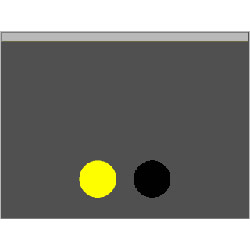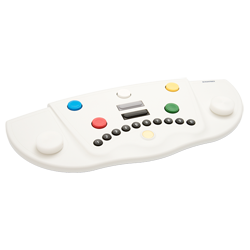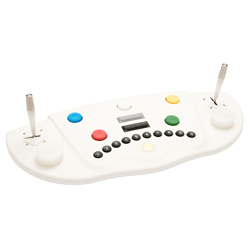
Vienna Reaction Test - RT - 1 Year License
Model 64045
Apart from recording reaction times down to the milli-second, it also covers the areas of alertness, the ability to repress an inadequate reaction (an area relevant in attention diagnostics), vigilance and intermodal comparisons (directed attention) in special forms. It can already be used with children starting from the age of 6.
Test Overview
Due to its clever combination of different test forms, the RT is ideally suited as a test battery to examine attention.
Main Areas of Application
- Aptitude diagnostics in the area of performance, industrial and organizational psychology
- Motor skills diagnostics
- Aviation psychology
- Sport psychology
- Traffic psychology
- Medicine and pharmacology
- Clinical psychology
Theoretical Background
With the Reaction Test, the measurement of the reaction time is possible for single-choice reactions and for simple multiple-choice reactions. The stimulus modalities light / tone and the characteristics red / yellow / white are available, so that different stimulus constellations for the measurement of reaction time can be produced. These can go from individual stimuli to simultaneous or sequentially presented stimulus combinations. The use of a rest and a reaction key makes the splitting into reaction and motor time possible.
Administration
The respondent receives the instruction, to press the reaction key only when relevant stimuli are presented.
Test Forms
Test forms S1-S5: assess the reaction time (split into reaction and motor time) needed to respond to simple and complex visual or audible signals. They also assess attention deficit disorders (it also serves to record the ability to repress an inadequate reaction and for inter-modal comparisons).
- S1: simple reaction yellow.
- S2: simple reaction sound.
- S3: choice reaction yellow / sound.
- S4: choice reaction yellow / red.
- S5: choice reaction yellow / sound or yellow / red.
- S6: This test form is especially suited to record the reaction time over a longer period of time under monotonous stimulus conditions (vigilance).
Test forms S7-S8: measurement of alertness.
- S7: simple reaction yellow (with audible warning signal).
- S8: simple reaction sound (with visual warning signal).
Test forms S9-S10: are particularly suitable for assessment situations in which absolute reaction times (i.e. not normed values) are important (e.g. for expert opinions in legal cases). These reaction times are not split into reaction and motor times.
- S9: simple reaction yellow, measurement of reaction time only;
- S10: simple reaction sound, measurement of reaction time only.
Scoring
The following main variables are calculated (depending on test form): mean reaction time and mean motor time, difference in mean reaction time with and without cue and difference in mean motor time with and without cue.
Reliability
Reliabilities (Cronbach's alpha) in the norm sample vary between r=0.83 and r=0.98 for reaction time and between r=0.84 and r=0.95 for motor time.
Validity
Content (logical) validity is given for the Reaction Test. The presentation of an individual stimulus for one second is such a simple requirement that it can be assumed that nothing other than a reaction to that stimulus occurs. Validity studies in the field of traffic psychology demonstrate among other things that there is adequate convergent validity.
Norms
Norm samples of the size N=75 to N=576 are available for all forms of the RT; some norms are also available separated by age, gender, and educational level. For a number of forms the following special norms are also available: norms for children or schoolchildren, drivers with conspicuous behaviour, Portuguese sample of adults, and traffic psychological clientele from Portugal.
Testing Time
Between 5 and 10 minutes (including instruction and practice phase), depending on test form.
VTS System Overview
The Schuhfried VTS enables computer-assisted application of a large number of highly diverse psycho-diagnostic tests and measuring procedures. In developing the system much emphasis was placed on transparent structure and largely uniform design. It is therefore simple to operate and easy to understand and does not require any special computer skills.
The VTS basic module is required for administration of any of the available tests.
The Schuhfried VTS supports the administration of both single tests and test batteries. Many of the single tests are available in different test versions. These test versions may differ, for example, in terms of test duration or difficulty or may be parallel forms. They are characterized by different parameters reflecting specific test requirements. They have been designed for administration to a specific population (e.g. psychiatric patients, children, etc.) or for special measuring purposes (e.g. repeated measurements). Test batteries are compiled from the available single tests and test versions.


